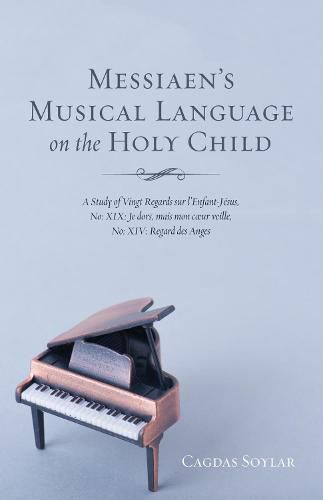Readings Newsletter
Become a Readings Member to make your shopping experience even easier.
Sign in or sign up for free!
You’re not far away from qualifying for FREE standard shipping within Australia
You’ve qualified for FREE standard shipping within Australia
The cart is loading…






This title is printed to order. This book may have been self-published. If so, we cannot guarantee the quality of the content. In the main most books will have gone through the editing process however some may not. We therefore suggest that you be aware of this before ordering this book. If in doubt check either the author or publisher’s details as we are unable to accept any returns unless they are faulty. Please contact us if you have any questions.
Olivier Messiaen was a prominent twentieth-century French composer. His musical language includes highly complicated concepts derived from a variety of sources. Hindu rhythms, Greek rhythms, and bird calls influenced him deeply; his Catholic faith, however, had the greatest impact on his compositions. I provide a detailed analysis of two religiously motivated pieces from his Vingt Regards sur l'Enfant-Jesus (Twenty Gazes upon the Infant Jesus), one of the most remarkable solo piano works of the twentieth-century, to explore how he integrates the Christian theology into his musical language. Je dors, mais mon coeur veille (I sleep but my heart waketh) is a dialogue that represents Messiaen’s mystic love of God, whereas Regard des Anges (Gaze of the Angels) is a celebration symbolizing the angels beholding the birth of Jesus Christ. I explain how the entirely different subjects of the two pieces are articulated in the change of pitch collections and rhythmic structures, as well as how the changes of musical language through the use of the different pitch collections generate the formal structure that is related to the biblical source.
$9.00 standard shipping within Australia
FREE standard shipping within Australia for orders over $100.00
Express & International shipping calculated at checkout
This title is printed to order. This book may have been self-published. If so, we cannot guarantee the quality of the content. In the main most books will have gone through the editing process however some may not. We therefore suggest that you be aware of this before ordering this book. If in doubt check either the author or publisher’s details as we are unable to accept any returns unless they are faulty. Please contact us if you have any questions.
Olivier Messiaen was a prominent twentieth-century French composer. His musical language includes highly complicated concepts derived from a variety of sources. Hindu rhythms, Greek rhythms, and bird calls influenced him deeply; his Catholic faith, however, had the greatest impact on his compositions. I provide a detailed analysis of two religiously motivated pieces from his Vingt Regards sur l'Enfant-Jesus (Twenty Gazes upon the Infant Jesus), one of the most remarkable solo piano works of the twentieth-century, to explore how he integrates the Christian theology into his musical language. Je dors, mais mon coeur veille (I sleep but my heart waketh) is a dialogue that represents Messiaen’s mystic love of God, whereas Regard des Anges (Gaze of the Angels) is a celebration symbolizing the angels beholding the birth of Jesus Christ. I explain how the entirely different subjects of the two pieces are articulated in the change of pitch collections and rhythmic structures, as well as how the changes of musical language through the use of the different pitch collections generate the formal structure that is related to the biblical source.